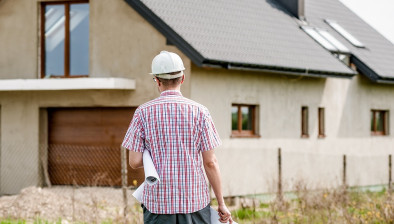The Margaret Taylor Interview: Sally Thomas

Sally Thomas
It is almost three years since Sally Thomas left her role at Teesside-based North Star Housing Association to become chief executive of membership organisation the Scottish Federation of Housing Associations (SFHA). Having spent her entire career in the English social housing sector she made the move north, she says, because she was “becoming increasingly frustrated by the financial, social and economic environment in England in terms of what social housing could do and the value it could bring”.
“Scotland seemed to be more conducive,” she continues. “There’s insufficient political commitment to social housing in England so there’s not enough money going into it. There’s a civic culture where social housing isn’t understood or appreciated as much as it could be.”
So far, her experience in Scotland has lived up to expectations, with Ms Thomas noting that the “history, culture and politics” of Scotland as well as the “greater propensity for political consensus around key issues” makes it easier for housing associations to achieve their aims.
“I’ve been really impressed by how strongly in favour of equality and fairness and the idea of no one being left behind Scotland is,” she says.
Those principles are currently being tested to their limits, though, with the onset of the coronavirus pandemic throwing the entire country into disarray and drawing attention to deep-seated structural inequalities. The social housing sector exemplifies this. The Scottish Government’s housebuilding programme, which was on schedule to have completed 50,000 new affordable homes by March next year, has had to be paused, hampering associations’ ability to provide more quality houses for the most needy in society. At the same time, the rental streams that housing associations rely on for their main source of income have become decidedly uncertain as swathes of tenants, many of whom hold down low-income jobs on zero-hours contracts, find themselves unable to earn a living amid the ongoing lockdown.
Despite the diversity of the organisations the SFHA represents, with the smallest responsible for just 14 homes and the largest for over 80,000, all are feeling the impact.
“The first part of the lockdown was controlled chaos,” Ms Thomas notes. “It was mad, but not so mad that it was spinning out of control. Essentially what housing associations were trying to do was respond to the situation as businesses, but also as providers of services to communities and tenants. They had to work out what the essential services they were going to continue to provide were, which meant going from a situation where they were doing lots of things to one where they had to decide what they had to do.”
On the one hand associations have had to ensure they are keeping their own staff safe, finding ways to source personal protective equipment and rethinking the way they work to minimise contact with tenants. On the other, they have had to ensure they continue to provide what can be lifeline services to people who in many cases are among the most vulnerable in society due to everything from poverty and chronic illness to infirmity and addiction.
“The overriding starting point was how to keep each other and our communities and tenants safe and well; everything else is secondary to that,” Ms Thomas says. “Over that first period of two to three weeks all our members got to a point where there was a suite of essential services that everyone recognised they had to keep providing. They had to keep people safe in their homes by making sure that, were possible, essential repairs were done, utilities continued and that people had warmth and heating. For people who are shielding or have underlying health issues housing associations have to provide services on a contactless basis and they have to keep them financially strong, into the welfare system if appropriate.”
Many housing association tenants are already users of the welfare system, whether that be because their vulnerabilities make them unable to work or because the kind of work they do does not pay enough for them to live off. With the lockdown forcing many employers into temporary shutdown, while those with at-risk relatives at home have had to stay off work to help shield them, many more have seen their incomes compromised. This has brought social landlords’ humanitarian responsibilities into sharper focus, with many now providing food and cash to their tenants in addition to ensuring their homes are kept safe and warm.
“For older people cash is still king - they don’t use contactless payments but depend on getting cash from the Post Office or credit unions every week,” Ms Thomas explains. “Where older people have had to stay at home they haven’t been able to get cash but they still need it so housing associations have been helping them to access cash and in some cases giving them money. As well as providing homes, housing associations have a huge social function and do a lot of community-based support work. The work they’re doing now is similar to the work they’ve been doing for many years, but it’s much more acute and much more dramatic. Previously they might have given cash on a very low-key, occasional basis to people who really needed it. Now it’s much more prevalent.”
In the grand scheme of things the amount of money landlords are giving to tenants is a tiny part of their overall budgets, and the funding of food packages for the most needy is unlikely to make a huge dent in their coffers. Despite this, Ms Thomas believes the overall impact of the pandemic will be felt much more keenly by housing associations at the strategic level.
“Supporting communities and giving away small amounts of cash and food is going to be at a very modest level compared to their overall income, but overall, on a strategic scale, housing associations may well suffer as a result of this,” she says. “We’ve set up a national social housing finance forum with the government, the regulator and the private finance industry - from whom housing associations get a lot of money - to monitor the situation.”
Already emergency legislation has been passed by the Scottish Government to allow housing associations to file their annual accounts three months after the normal deadline, something that will give them breathing space to focus on practicalities while the lockdown remains in place. It is a mark of how delicate the situation is, though, that the other main piece of legislation aimed at the sector has the potential to have a direct negative impact on those accounts.
“The first lot of emergency legislation that went through parliament had an aspect that, in effect, postponed evictions,” Ms Thomas says. “People are in financial difficulty and housing associations will do their best to help them as far as they are possibly able to. They also have to maintain their rental income because it is the rental income that provides the money to keep their housing safe and keep utilities going. It’s a real balancing act because they need to keep their houses in good condition.”
As another main priority of housing associations is to keep tenants safe, Ms Thomas says she was particularly pleased the government included an exemption to the no-eviction rule that means landlords will be able to remove domestic abusers from their homes while the emergency legislation is in place.
“Where a housing association or local authority needs to evict on the back of domestic abuse or criminal activity that’s still there,” she explains. “It was very important that we had that exemption in because there will be occasions where evictions will be necessary. Housing associations have a huge role to play because domestic abuse happens, by and large, in the home. Being able to deal with it, tackle it, challenge it is all part of the work of a housing association.”
Including such an exemption is exactly the kind of thing Ms Thomas would have expected of the Scottish legislature when she made the move here three years ago. That said, with the SFHA helping the government come up with a plan to ensure the social housing sector remains robust in the wake of the lockdown, she concedes that Scotland has its work cut out for it if its reputation for equality and fairness is to survive.
“Those who have been left behind so far have a better chance of being in a better place [after lockdown] because we’re making decisions as a country that focus on that,” she says. “Private sector decisions are important but equally important is the social fabric of the country. We have to be in it together and we have to build back better. That, for me, sums it up - we have to build back out of this in every aspect and we have to build it back better than it was before.
“I think Scotland has the potential to achieve a new social settlement, which is fair and equal and represents everyone’s needs and aspirations. It has the potential to do that in its own right and it has the political, economic, cultural and social environment to do that. We all have to have our hands to the pump to make it happen.”








